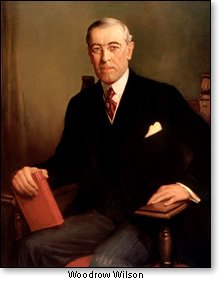Long-lasting effects of the 'Great War'
Wes Vernon, RenewAmerica analyst
The 100th year anniversary this month of the end of World War I gave us time to reflect on the worldwide disquiet that ensued after that bloody conflict and its long-lasting destructive effect that haunt us to this day. We were thus able to review the hugely pivotal dividing point in history and to see why much of the relative calm that prevailed before then is viewed by many historians as "strange."
Not that all was sweetness and light before that "dividing time" in our world. But prior to and through the end of world War I, countries marched to protect their national interests. After World War I, countries began going to war over ideas.
 Vladimir Lenin and Woodrow Wilson launched their crusades for different motivations. But between the two of them, they pursued what noted historian Arthur Herman describes as efforts with a cumulative effect that "unleashed the disruptive ideologies that would sweep the world, from globalism to Communism and terrorism."
Vladimir Lenin and Woodrow Wilson launched their crusades for different motivations. But between the two of them, they pursued what noted historian Arthur Herman describes as efforts with a cumulative effect that "unleashed the disruptive ideologies that would sweep the world, from globalism to Communism and terrorism."
Vladimir Lenin took advantage of the chaos in Europe's "Great War" to launch his overthrow of the democratic Russian regime that had already brought down the Czars ' centuries-long dictatorial governance, whereupon Lenin's communist crusade would result in setting up the most repressive totalitarian regime in history, the Soviet Union.
President Woodrow Wilson, for his part, had a huge messianic impulse that drove his efforts to thrust the United States into the First World War in order to "make the world safe for democracy" – only to see his dreams for a liberal international system dissolve into chaos, bloodshed, and betrayal.
Arthur Herman, Ph.D., the respected historian and Senior Fellow at the Hudson Institute, tells the fascinating story of this century-old event that was widely noted on the November 11th 100-year anniversary of the Great War's end. Dr. Herman's book was reviewed by this column last April. A revisit of that review might interest our readers. Better yet, the book itself is 1917: LENIN, WILSON, AND THE BIRTH OF THE NEW WORLD DISORDER. It's a real page-turner, especially for a history aficionado.
© Wes Vernon
November 12, 2018
The 100th year anniversary this month of the end of World War I gave us time to reflect on the worldwide disquiet that ensued after that bloody conflict and its long-lasting destructive effect that haunt us to this day. We were thus able to review the hugely pivotal dividing point in history and to see why much of the relative calm that prevailed before then is viewed by many historians as "strange."
Not that all was sweetness and light before that "dividing time" in our world. But prior to and through the end of world War I, countries marched to protect their national interests. After World War I, countries began going to war over ideas.
 Vladimir Lenin and Woodrow Wilson launched their crusades for different motivations. But between the two of them, they pursued what noted historian Arthur Herman describes as efforts with a cumulative effect that "unleashed the disruptive ideologies that would sweep the world, from globalism to Communism and terrorism."
Vladimir Lenin and Woodrow Wilson launched their crusades for different motivations. But between the two of them, they pursued what noted historian Arthur Herman describes as efforts with a cumulative effect that "unleashed the disruptive ideologies that would sweep the world, from globalism to Communism and terrorism."Vladimir Lenin took advantage of the chaos in Europe's "Great War" to launch his overthrow of the democratic Russian regime that had already brought down the Czars ' centuries-long dictatorial governance, whereupon Lenin's communist crusade would result in setting up the most repressive totalitarian regime in history, the Soviet Union.
President Woodrow Wilson, for his part, had a huge messianic impulse that drove his efforts to thrust the United States into the First World War in order to "make the world safe for democracy" – only to see his dreams for a liberal international system dissolve into chaos, bloodshed, and betrayal.
Arthur Herman, Ph.D., the respected historian and Senior Fellow at the Hudson Institute, tells the fascinating story of this century-old event that was widely noted on the November 11th 100-year anniversary of the Great War's end. Dr. Herman's book was reviewed by this column last April. A revisit of that review might interest our readers. Better yet, the book itself is 1917: LENIN, WILSON, AND THE BIRTH OF THE NEW WORLD DISORDER. It's a real page-turner, especially for a history aficionado.
© Wes Vernon
The views expressed by RenewAmerica analysts generally reflect the VALUES AND PHILOSOPHY of RenewAmerica — although each writer is responsible for the accuracy of individual pieces, and the position taken is the writer's own.
(See RenewAmerica's publishing standards.)
